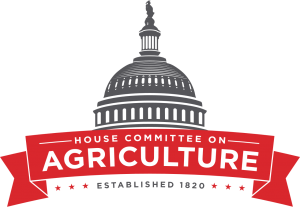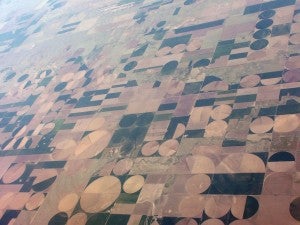 When it comes to technology and agriculture, policymakers are wrestling with the role government should play in protecting the intellectual property rights and privacy of farmers.
When it comes to technology and agriculture, policymakers are wrestling with the role government should play in protecting the intellectual property rights and privacy of farmers.
This discussion came to a head recently when the House Agricultural Committee held a hearing to examine the impacts of “big data” on the entire agricultural life cycle. With farmers and companies collecting and storing data on everything from fertilizer rate to yield to soil conditions, there are important concerns to consider: Is the data secure? Who owns analyzed data? Will companies sell the data to others or make new products based on sensitive information?
Ahead of this hearing I wrote a blog post detailing the hurdles farmers must overcome to fully integrate data as a way to increase the abundance and sustainability of modern food production. The main challenges I highlighted were:
- Privacy: Farmers need to know they won’t be willingly revealing trade secrets when deciding to share data about their farming techniques.
- Format: Not all data collection platforms use the same language, so a uniform way to understand what is being collected must be created.
- Complexity: Many growers are intimidated by the vast quantity of data they collect, so we have to help them understand what matters and what doesn’t.
 A positive sign coming out of the House Agricultural Committee’s hearing was that the private sector is aware of these particular issues. Collectively they have already made provisions to address formatting challenges and mitigate data complexity. The main challenge still seems to be about privacy and the role government could take to protect information about how, what, and where farmers grow their crops.
A positive sign coming out of the House Agricultural Committee’s hearing was that the private sector is aware of these particular issues. Collectively they have already made provisions to address formatting challenges and mitigate data complexity. The main challenge still seems to be about privacy and the role government could take to protect information about how, what, and where farmers grow their crops.
Building trust
The major point around data collection is trust. Farmers need to be able to trust that their data will be analyzed to produce productive insights that will benefit the ag industry. They do not want the data to be made available to competitors, monetized, or exploited for profit. Tim Crawford, CIO and president of the consultancy AVOA, put it succinctly when he was quoted in the magazine Datamation:
“So if I trust that Apple will only use this data for their purposes to make Siri better, then that might be okay. But having Apple sell the data and Apple benefitting financially or making it publicly available and potentially compromising my behavior, that’s where you lost trust.”
Several witnesses at the public hearing advocated for a private sector-led approach to ensuring proprietary data be protected. Matt Rushing, an executive at agricultural equipment manufacturer AGCO, said his firm has separated its data pipelines: one for machine data and one for more sensitive agronomic data.
Such a solution is a good stopgap but the question remains as to whether such a move has increased the level of trust customers feel around data security and sensitivity. And it doesn’t address the challenge of who owns and can make a profit from the analysis of the data.

Credit: Flickr user Djof
Ag data as a trade secret?
The other main point panelists made about trust came during a discussion about recourse available if and when issues such as data breaches or profiteering take place.
Shannon Ferrell from Oklahoma State University’s Department of Agricultural Economics said farmers have little recourse under current privacy, patent, and copyright laws. She did say, however, that their main avenue to pursue alleged malfeasance or wrongdoing would be to categorize their data as trade secrets. The main difference here is that the federal government oversees privacy, patent, and copyright laws, while states are responsible for trade secret litigation.
Public-private collaboration
All the witnesses at the hearing praised the House Agricultural Committee for its foresight in bringing together leaders in ag tech. I, too, am encouraged by the committee’s awareness of these concerns – and by the potential solutions discussed by participants and panelists.
Government’s role in the big data debate is still up in the air, but one thing is clear – companies and farmers aren’t slowing down their data collection efforts anytime soon. This data has huge benefits for the planet. The more we know about farm management, the more precise changes we can make to help farmers save money while reducing environmental impacts.
Big data can help growers showcase their stewardship – and take advantage of emerging carbon market opportunities and supply chain demand for sustainable grain.
Related
Ag’s big data explosion can benefit the environment, too
How to overcome big data’s barriers









